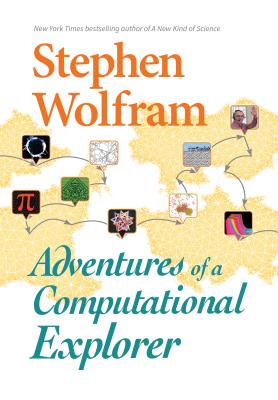Review: Stephen Wolfram’s “Adventures of a Computational Explorer”
by Miles Raymer
Note: Wolfram Research, Inc. was kind enough to send me a free copy of this book in exchange for an honest review.
If there were a contest for the world’s most self-satisfied human, I’d nominate Stephen Wolfram. This brainiac was publishing physics papers at the age of 15, received a PhD at 20, wrote a 1,200-page book on the fundamental laws of science, and runs a private company that has survived and thrived in the tech industry for more than three decades. I note these facts with equal feelings of frustration and admiration, for Wolfram’s writing is that of an accomplished person who tiresomely celebrates those accomplishments at every possible opportunity. Kind of like a genius uncle who is way more successful than the rest of your family but can’t shut up about it.
Adventures of a Computational Explorer is a collection of essays and blog posts loosely tied together by what Wolfram calls “the computational paradigm” (vii). The twin pillars of this paradigm are the Principles of Computational Equivalence and Computational Irreducibility. The former “says that the universe of possible computations––even done by simple systems––is full of computations that are as sophisticated as one can ever get,” and the latter “says that many systems that appear complex will have behavior that can never be ‘reduced’ in general to a simpler computation” (323-4, 32).
If you find those statements both intriguing and confusing, you’re in good company. As someone who’s comparatively illiterate when it comes to math, my ability to understand and critique Wolfram’s computational paradigm is nonexistent. So, instead of attempting to engage with his mathematical ideas directly, I’ll comment on some general reactions I experienced during my often-tenuous attempts to wrap my head around this book’s content.
Wolfram possesses a voracious appetite for information gathering and technical problem-solving, and his computational adventures have led him to a few conclusions about human life and the natural world that seem spot on to me. The first of these is the paradoxical way in which human life is both special and not special at the same time. The Principle of Computational Equivalence effectively undermines the notion that the particular kinds of computation that make human cognition and technology possible are unique:
We might have believed that our own intelligence, our technology, and the physical universe we inhabit would all have different levels of computational sophistication. But the Principle of Computational Equivalence implies that they do not. So even though we may strive mightily to create elaborate technology, we will ultimately never be able to give it any fundamentally greater level of computational sophistication. Indeed, in a sense all we will ever be able to do is to equal what already happens in nature. (109)
This humbling perspective is valuable, and Wolfram does a good job of not allowing it to slide into cynicism or relativism. Instead, he focuses on the amazing potential of learning to imitate and tweak “what already happens in nature” in fun and fascinating ways. This puts humans in the honorable position of being the one species on Earth most directly pursuing the fruits of natural law, while simultaneously relinquishing all unfalsifiable claims about ontological or religious meaning.
What follows from this perspective is that we need to pay attention to human history and cultural context:
Increasingly, we can automate the things we humans can do––even ones that involve reasoning, or judgment, or creativity. But what we (essentially by definition) can’t automate is defining what we want to do, and what our goals are. For these are intimately connected to the details of our biological existence, and the history of our civilization––which are exactly what’s special about us. (37-8)
[We should heed] the long story of science showing us that we’re not fundamentally special. We can’t look for ultimate meaning in where we’ve reached. We can’t define an ultimate purpose. Or ultimate ethics. And in a sense we have to embrace the details of our existence and our history. (276)
Although he often appears overly preoccupied with revealing the non-contextual, all-encompassing nature of existence through computational models, Wolfram also displays a sincere appreciation for the quirks and queernesses that make humans stand out from the white data-noise of the cosmos.
Many chapters in Adventures of a Computational Explorer delve into Wolfram’s personal lifestyle and work habits, and seem to serve no purpose beyond enumerating his many achievements and modes of professional optimization. I sometimes felt that Wolfram was advocating for a kind of self-sustained workaholism, with most features of his “personal infrastructure” designed around never having to unplug from his job (Chapter 23). Good fodder for fanboys, but didn’t work for me.
I finished this book in a state of intellectual unease, which derived partly from discomfort with my own judgmental attitude toward Wolfram’s self-aggrandizing tendencies. There are few contexts in which I would object to a brilliant person pursuing their natural curiosity wherever it leads, and I actually believe that progress depends on our civilization’s willingness to allow our most expansive minds to explore, test, and fiddle with the dials of human destiny. But it also seems like, for all his success, Wolfram has done little to actually make the world a better place. I could be totally wrong about this and simply unaware of Wolfram’s contributions to humanitarian causes, but this book gives the impression that his vast intelligence and wealth are primarily serving a narrow set of abstract computational goals, rather than the common good. I am of course in no position to tell anyone––let alone an august figure such as Wolfram––how to spend their time and money, so I note this only as a record of my genuinely conflicted reaction to his text.
Rating: 5/10
